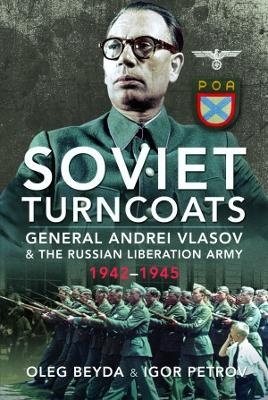
Soviet Turncoats
Pen & Sword Military (Verlag)
978-1-5267-8001-0 (ISBN)
In April 1945, in one of the final battles of the Second World War, on the Oder river east of Berlin, Russian troops, clad in German uniforms, fought against the advancing Red Army. Why would Russians fight against their compatriots, and how did the Soviet collaboration come about?
In this insightful and meticulously researched study Oleg Beyda and Igor Petrov answer these questions and explore, in vivid detail, the wider issue of the collaboration of Soviet citizens with the Axis powers. Their work throws a fascinating new light onto this long-suppressed aspect of the Great Patriotic War, a crucial topic that remains deeply controversial in contemporary Russia.
The most famous figure in this complicated history is Andrei Vlasov, the captured Red Army general who defected to the Germans and became the commander of the Russian Liberation Army. His wartime career, and the careers of the other Soviet prisoners of war and Russian migr s who joined him, are the central characters in the story. The motivations of these men varied: while some had switched loyalties out of conviction, for many POWs the choice was between collaboration or slow death in a German prison camp.
As the book reveals, for the most of its history, the Russian Liberation Army remained a German propaganda project, a hodgepodge of scattered yet effective military units from former POWs under strict German command. Nevertheless, Vlasov and his officers sometimes sought to conduct their own policy independent of their German masters. Right at the end of the war, in Prague, in a desperate attempt to do right' by the Allies, Vlasov's units fought against German troops, yet again changing sides.
The challenges these men faced, and the choices they had to make between loyalty, anti-Bolshevism and survival, make this book a fascinating reading.
Dr Oleg Beyda has completed his PhD in History at the University of New South Wales, Canberra. He has worked at the University of Western Australia and the University of Melbourne where he has been employed as a senior tutor. His recent publications include two chapters on French and Soviet collaboration with the German side in David Stahel (ed.), Joining Hitler's Crusade: European Nations and the Invasion of the Soviet Union, 1941, and the annotated memoirs of an migr who served in the Spanish Blue Division', Un ruso blanco en la Division Azul. Memorias de Vladimir I. Kovalevski (1941). Igor Petrov is an independent researcher based in Munich. His main areas of interest include Russian emigration in Germany prior to, during and after the Second World War and Soviet collaboration with the Axis powers during the Second World War. He has translated, edited and commented on the Russian publication of Alfred Rosenberg's diaries, Politicheskii dnevnik Al'freda Rozenberga: 1934-1944. He co-authored a large series of radio broadcasts entitled Russian Collaboration on Radio Liberty, and a chapter on the same topic in Joining Hitler's Crusade edited collection. His works have been published in numerous journals and magazines, including Neprikosnovennyi Zapas and Istoricheskaia Ekspertiza.
| Erscheinungsdatum | 09.04.2024 |
|---|---|
| Zusatzinfo | 30 black and white illustrations |
| Verlagsort | South Yorkshire |
| Sprache | englisch |
| Maße | 156 x 234 mm |
| Themenwelt | Geschichte ► Allgemeine Geschichte ► 1918 bis 1945 |
| Geschichte ► Teilgebiete der Geschichte ► Militärgeschichte | |
| ISBN-10 | 1-5267-8001-1 / 1526780011 |
| ISBN-13 | 978-1-5267-8001-0 / 9781526780010 |
| Zustand | Neuware |
| Haben Sie eine Frage zum Produkt? |
aus dem Bereich


